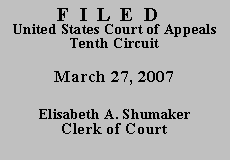

| RAYMOND JARAMILLO, |
|
| v. | |
| CHRISTINE VALLEJOS, Warden; THE ATTORNEY GENERAL OF THE STATE OF NEW MEXICO, |
At issue is the construction of Mr. Jaramillo's plea agreement in New Mexico state court. Under the agreement he would plead guilty to two counts of attempting to traffic a controlled substance. The agreement described the first count as Count I in a case with file number CR-2004-31 and described the second count as Count I in a case with file number CR-2004-32. The second page of the agreement contained a paragraph that read: "Additional charges. The following charge will be dismissed, or if not yet filed, shall not be brought against the defendant: CR-2004-32: COUNT II: Possession of Drug Paraphernalia." R. Doc. 10 Ex. E at 2.
The state court approved the plea agreement and sentenced Mr. Jaramillo to three years' imprisonment on each count, the terms to run consecutively. Mr. Jaramillo sought state post-conviction relief, arguing that he had been sentenced twice for the same offense. The state district court denied relief. He sought a writ of certiorari from the New Mexico Supreme Court, again raising his double-jeopardy argument. That court also denied relief.
The Antiterrorism and Effective Death Penalty Act of 1996 (AEDPA) provides that when a claim has been adjudicated on the merits in state court, a federal court will grant habeas relief only when the applicant establishes that the state-court decision was "contrary to, or involved an unreasonable application of, clearly established Federal law, as determined by the Supreme Court of the United States," or "was based on an unreasonable determination of the facts in light of the evidence presented in the State court proceeding." 28 U.S.C. § 2254(d)(1), (2). "Under the 'contrary to' clause, we grant relief only if the state court arrives at a conclusion opposite to that reached by the Supreme Court on a question of law or if the state court decides a case differently than the [Supreme] Court has on a set of materially indistinguishable facts." Gipson v. Jordan, 376 F.3d 1193, 1196 (10th Cir. 2004) (brackets and internal quotation marks omitted). "Under the 'unreasonable application' clause, relief is provided only if the state court identifies the correct governing legal principle from the Supreme Court's decisions but unreasonably applies that principle to the facts of the prisoner's case." Id. (brackets and internal quotation marks omitted). Thus a habeas writ may not issue "simply because we conclude in our independent judgment that the relevant state-court decision applied clearly established federal law erroneously or incorrectly. Rather, that application must also be unreasonable." Id. (internal quotation marks omitted). Because the state courts adjudicated Mr. Jaramillo's claim on the merits, we incorporate AEDPA's deferential treatment of state-court decisions into our consideration of his request for a COA. See Dockins v. Hines, 374 F.3d 935, 938 (10th Cir. 2004).
Mr. Jaramillo essentially contends that his plea agreement provided for dismissal of both Counts I and II in CR-2004-32, so his two consecutive sentences must each be punishment for his conviction on Count I in CR-2004-31. Because this reading of the agreement is clearly wrong, the state courts' denial of his double-jeopardy claim was not an unreasonable application of clearly established federal law. The federal district court's resolution of this issue was neither debatable nor wrong. See Slack v. McDaniel, 529 U.S. 473, 484 (2000) (describing standard for granting a COA).
In his application for a COA Mr. Jaramillo also contends that his plea agreement was involuntary and asserts a denial of his right to due process and equal protection. But because he did not raise those claims in district court, we will not address them. See Parker v. Scott, 394 F.3d 1302, 1307 (10th Cir. 2005).
We DENY Mr. Jaramillo's application for a COA and DISMISS the appeal.
ENTERED FOR THE COURT
Harris L Hartz
Circuit Judge